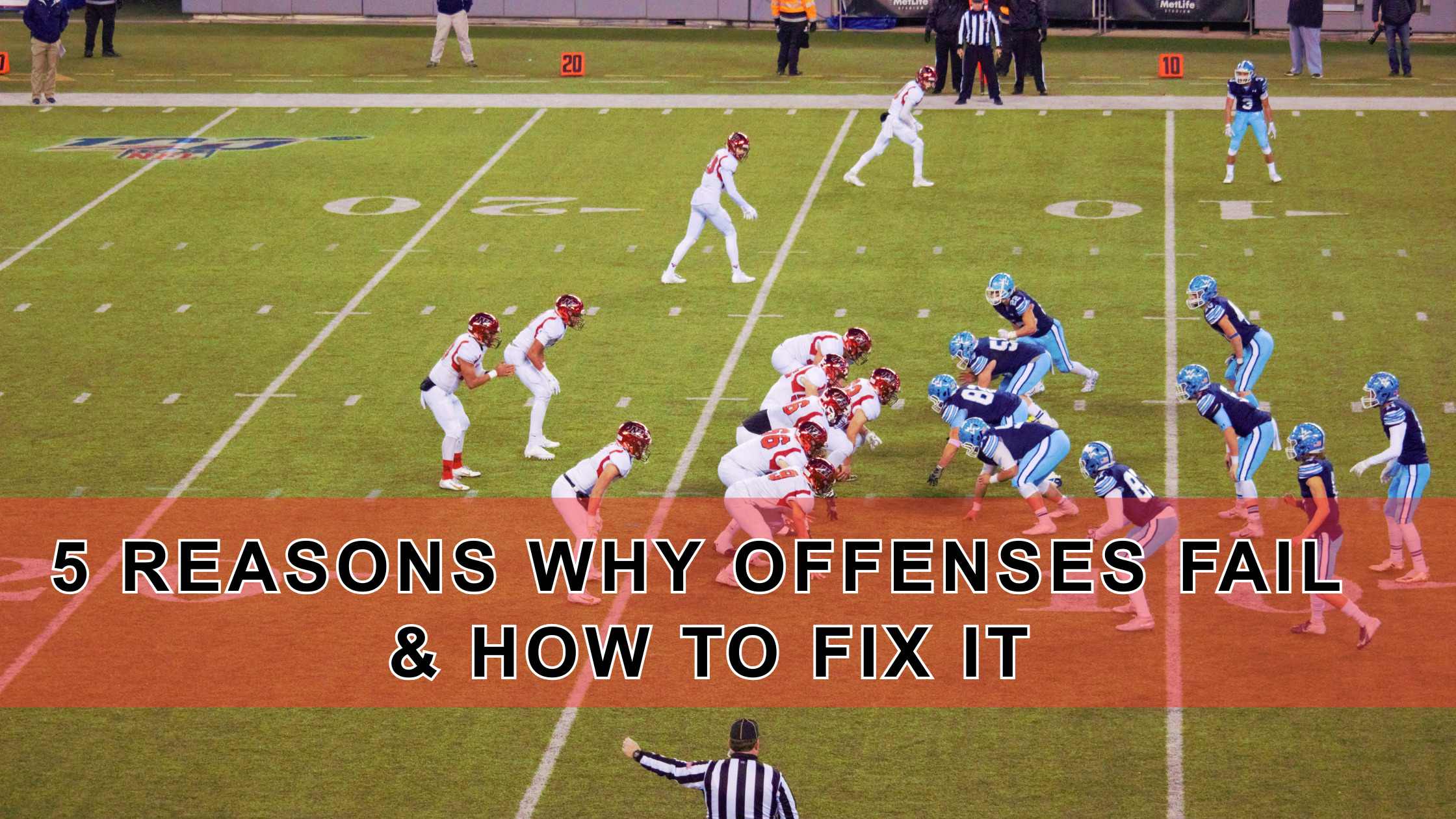5 Reasons Why Offenses Fail in Youth Football

1) Too Many Plays / No System
The biggest mistake that I see youth football coaches make is that they have too many plays installed. They have a bunch of plays but their kids haven’t mastered any of them. What you need to do is to have a couple core plays and get really good at those. Once your team has mastered you core plays you then can add tags, adjustments, and formations. When selecting core plays be sure to have plays that attack all areas of the field. For example- have an edge plays, have an off-tackle plays, have an interior play, have a counter play, and have two play-action passes off of your best run plays.
Keep in mind that it is always easier to add formations than it is to add plays. Get really good at your core plays, then add formations! You should run all of your core plays out of three formations- a balanced formation, an unbalanced formation, and a spread formation. This will allow you to be multiple, while keeping thing simple for your kids. When you have too many plays kids tend to get overwhelmed, which will lead to mistakes and slow / indecisive execution.
Why it fails:
-
Kids get overwhelmed trying to memorize too many plays, formations, or shifts.
-
Confusion leads to mental errors, busted plays, slow execution, and pre-snap penalties (false starts, illegal formations).
-
Time in practice is spread too thin trying to install too much, leaving no time to master the basics.
Solution:
-
Simplify the playbook. Stick to a handful of core plays that can be run from a couple formations.
-
Rep those plays repeatedly in practice to build timing, confidence, and consistency.
- Select a system that you and your coaches can teach confidently and fluently.
4 Sections of the Explosive Offense Clinic (Clinic Curriculum)
The Explosive Offense Mastery Clinic gives you a proven 4-step blueprint to ignite your offense, create game-changing big plays, and turn every drive into a scoring opportunity.
- Section 1: Running a System of Plays
-
Section 2: Using Formations to Create Alignment Conflict for the Defense
-
Section 3: Utilizing Motion to gain Leverage and Numbers Advantage over the Defense
-
Section 4: 3- Pillar Play Calling Strategy / No Huddle
Download / Learn More (YFO Website): Explosive Offense Mastery Clinic
Download / Learn More (Social Media / Stan Store): Explosive Offense Mastery Clinic
2) Poor Offensive Line Play
We have a saying- if you control the line of scrimmage, you will control the game. We all know that if you want to be successful all players have to be able to block. A lot of poor offensive line play stems from poor coaching. Many offensive linemen aren’t taught the proper technique for blocking. Offensive linemen don’t have any run schemes / blocking rules- they are told to block the defender in front of them. Many times kids don’t know who to block (no installed blocking rules / run schemes) so they become indecisive and play much slower. Pass blocking on the youth football level is typically really bad.
Why it fails:
-
Linemen don’t know who to block or how to use proper technique.
- Offenses don’t have a structured attack / system, just a bunch of random plays.
-
Teams struggle against even basic defensive fronts- because no blocking rules are given and repped.
-
The line collapses under pressure, causing plays to break down before they start- pass protection.
Solution:
-
Prioritize offensive line development in practice with dedicated position time.
-
Focus on base blocking technique- starts with stance all the way to the finish.
- Implement down blocking it is an equalizer!
-
Teach effort and physicality — even basic blocking can go a long way with proper intensity.
- Join our Winning Edge Coaches Community! It has a huge offensive line resource section.
Join the Winning Edge Coaches Community

- Mastering Pass Blocking: Techniques, Rules & Coaching Tips
- Run Scheme Blocking Rules PDF (Belly, Buck, Trap, & Wedge)
- Proper Technique For Down Blocking | Down Blocking Scheme
- Proper Technique For Power Steps | Fire Step / Get Off
- Proper Technique for Offensive Line Stance
- One Blocking Scheme for all Plays
- How to Execute the GH Counter | Blocking Scheme
- How to Execute the Trap Play | Blocking Scheme
- Winning with the Trap Play Clinic
- Base Blocking Technique (resource)
- Guide to Executing a Dead Ball Snap in Football
- New content uploaded weekly
Join Today: Winning Edge Coaches Community
3) Poor Utilization of Personnel
In youth football, talent isn’t evenly distributed. You usually have a few standout athletes — and the key is to make sure they’re consistently involved in the offense. You have to understand the personnel you have and adjust your formations and schemes accordingly. Coaches typically don’t do a good job utilizing formations to stress the defense. Coaches typically don’t move their stud player around to different positions which will stress the defense. Many coaches will try to put a square peg, through a round hole.
Why it fails:
-
Coaches may use generic offensive systems without tailoring them to their team’s unique strengths.
-
Some athletes are placed in the wrong positions.
-
Coaches don’t utilize different formations create alignment conflict- too simple from a formation standpoint.
Solution:
-
Identify your top 2–3 athletes and find creative ways to get them involved — handoffs, screens, jet sweeps, wildcat snaps.
-
Adjust positions to maximize impact. If your fastest kid is playing guard, you’re missing an opportunity.
-
Build your offense around your players, not the other way around.
- We created a resource that will help you pick the right offense for your team. Article: Selecting the Right Offense for Youth Football Team.
4) Overly Complex Playbook
Many youth football coaches try to implement offensive systems that are too complicated for young athletes. This often stems from good intentions — wanting to emulate high school or college-level offenses — but it backfires.
Why it fails:
-
Kids get overwhelmed trying to memorize too many plays, formations, or shifts.
-
Confusion leads to mental errors, busted plays, and pre-snap penalties (false starts, illegal formations).
-
Time in practice is spread too thin trying to install too much, leaving no time to master the basics.
Solution:
-
Simplify the playbook. Stick to a handful of core plays that can be run from a couple formations. This will allow you to be multiple while keeping things simple for your kids.
-
Rep those plays repeatedly in practice to build timing, confidence, and consistency.
- Get a playbook from our Playbook library! Our playbooks will provide you with a system of plays that all complement each other. We have playbooks for all age and team skill sets. Visit: YFO Playbook Library .
5) Inefficient Play Calling
Many youth football offensive coordinators will call plays just to call plays- they won’t have a structured play calling strategy. Another common mistake is that they won’t have a system of plays install that have answers for what the defense is doing. It’s important to understand that it takes a village to call an offense. The OC needs to have coaches watching the defense. Have a coach watch what the defensive ends are doing. Have a coach watch how the linebackers are aligning and have a coach look for when the defense puts in minim play players.
Watch our FREE Offensive Play Calling Strategy Clinic.
Why It fails:
- Installing too much too soon. Players will get overwhelmed and confused. Practice time is spread too thin across too many concepts. Execution suffers because of lack of execution.
- Forcing a system that doesn’t fit your players.
- Build the offense around the strengths of your team — not the other way around. Put your best athletes in position to make plays.
- Ignoring down-and-distance, red zone, or clock management during practice and games.
Solution
- Install a small, core set of plays and build confidence through repetition. Add wrinkles later in the season once the foundation is solid.
- Utilize coaches! Have coaches watch what the defense is doing- then they can communicate that to the OC.
- Utilize coaches! Make sure your position coaches are watching their positions during the game- so they can see if mistakes are being made and correct them.
- Practice situational football! Particularly, two minute offense.
These are the 5 reasons why offenses fail in youth football. These are common mistakes that many youth football coaches make. If you avoid doing these 5 things you’ll be much better offensively. Be sure to check out the other resources we provided- they will help you score more points and win more games.












